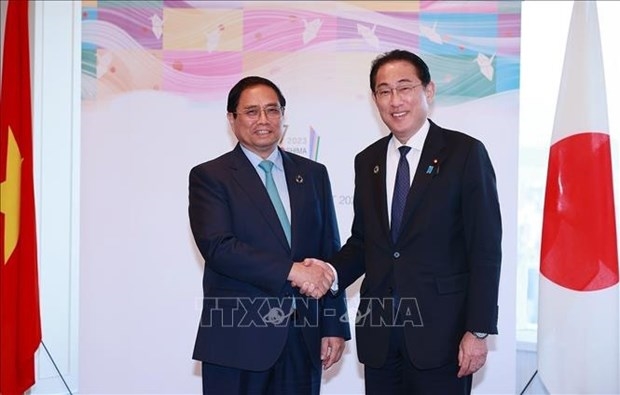 |
| Prime Minister Pham Minh Chinh (L) and his Japanese counterpart Fumio Kishida. (Photo:VNA) |
This is the first Vietnam-Japan high-level talks to take place in Hiroshima, the hometown of PM Kishida, and the fifth between the two PMs in more than a year.
Chinh congratulated Kishida and host Japan on successfully organising the G7 and G7 expanded Summits, and spoke highly of Japan's coordinating role to reach consensus in solving global challenges such as food security and emission reduction.
Kishida welcomed the active and effective participation in and contribution of the Vietnamese delegation to the success of the G7 expanded Summit, affirming that Vietnam holds a leading position in the implementation of Japan's foreign policy in the region.
The two leaders expressed their satisfaction at the strong, comprehensive and substantive development of the two countries' relations over the past time; and agreed on major orientations and specific measures to promote the extensive strategic partnership between Vietnam and Japan for peace and prosperity in Asia to a new height.
They agreed to strengthen political trust by stepping up high-level visits and contacts in 2023 which marks the 50th anniversary of the establishment of bilateral diplomatic relations.
The PMs also reached a consensus on enhancing defence-security cooperation in the settlement of the post-war consequences, human resources training, technology transfer, and cyber security.
The two leaders appreciated the completion of procedures for capital commitment of the new generation official development assistance (ODA) programme for post-pandemic economic recovery worth 50 billion JPY (362.4 million USD); and affirmed to direct relevant ministries and sectors to accelerate the progress of several ODA projects such as Cho Ray Hospital 2, Ben Thanh-Suoi Tien Metro Line No.1.
Regarding the Nghi Son Oil Refinery project, PM Chinh suggested the two countries’ businesses actively exchange ideas in the spirit of harmonising benefits, sharing risks, and removing difficulties of the project.
He also proposed the two sides work together to promote a new wave of Japanese investment in Vietnam in the fields of high-tech industry and energy transition to help Vietnamese firms participate more deeply and widely in the supply chains of Japan and the globe.
The Vietnamese PM also proposed the Japanese Government to create favourable conditions and simplify procedures for granting visas towards the exemption of entry visas for Vietnamese citizens to promote tourism cooperation between the two countries, and pay more attention to the 500,000-strong Vietnamese community in the country.
The two sides affirmed to coordinate their stances on issues of mutual concern at multilateral and regional forums such as ASEAN, the United Nations, and the Asia-Pacific Economic Cooperation (APEC). Kishida invited Chinh to visit Japan again and attend the ASEAN-Japan Summit in December.
Regarding the East Sea issue, the leaders emphasised the importance of ensuring navigation and aviation security and safety, solving all disputes and differences by peaceful means on the basis of international law, especially the 1982 UN Convention on the Law of the Sea (UNCLOS),fully implementing the Declaration on the Conduct of Parties in the East Sea (DOC), and soon completing an effective and substantive Code of Conduct in the East Sea (COC).
Before the talks, the two witnessed the exchange of signed documents of three ODA cooperation projects with a total value of 61 billion JPY, including a new-generation ODA support programme for post-pandemic socio-economic recovery and development, a public transport infrastructure project in Binh Duong province, and an agricultural development infrastructure project in Lam Dong province.
This is the last activity of PM Chinh during his trip to attend the G7 expanded Summit and pay a working visit to Japan. In the evening of the same day, he and the high-ranking Vietnamese delegation left Hiroshima for Hanoi, successfully concluding his trip./.